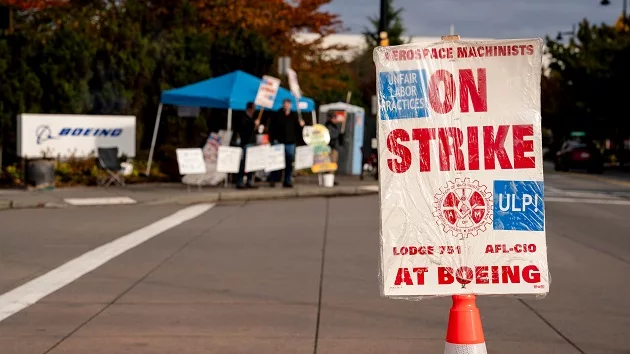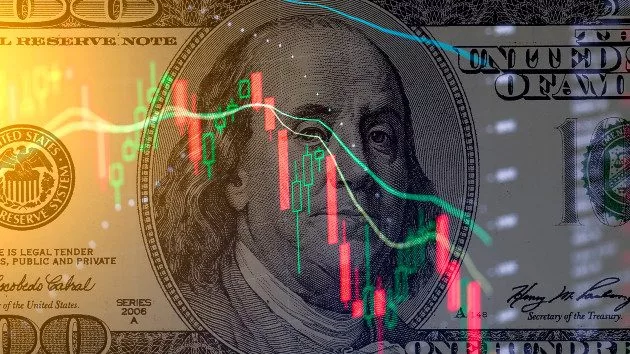
(NEW YORK) — Tens of thousands of Boeing machinists on Wednesday will vote on a new contract proposal that could end a weekslong work stoppage against the embattled aerospace company.
Workers overwhelmingly rejected a previous offer last month, putting the outcome of the impending vote in doubt.
Hours before workers were set to cast ballots, Boeing released an earnings report showing the company had lost a staggering $6.1 billion over the most recent quarter due primarily to costs associated with the strike.
“We have some really big rocks that we need to get behind us to move the company forward,” Boeing CEO Kelly Ortberg said in a letter to investors on Wednesday.
Ortberg singled out the strike as an issue that must be addressed “first and foremost.”
“We have been feverishly working to find a solution that works for the company and meets our employees’ needs,” Ortberg said.
The new offer delivers a 35% raise over the four-year duration of the contract, upping the 25% cumulative raise provided in the previous offer. The offer, however, falls short of workers’ demand for a 40% cumulative pay increase.
The proposal also hikes Boeing’s contribution to a 401(k) plan, but it declines to fulfill workers’ call for a reinstatement of the company’s defined pension. The contract includes a $7,000 ratification bonus for each worker, as well as a performance bonus that Boeing had sought to jettison.
The International Association of Machinists and Aerospace Workers (IAM), the union representing 33,000 Boeing workers, released a statement on Saturday calling the proposal “worthy of consideration.”
“With the help of Acting U.S. Secretary of Labor Julie Su, we have received a negotiated proposal and resolution to end the strike, and it warrants presenting to the members,” IAM said.
The company and its workers have faced significant financial losses during the nearly six-week strike.
Union members have received $250 per week from a strike fund, beginning in the third week of the work stoppage. That compensation marks a major pay cut for many of the employees.
Mid-ranking workers involved in the strike typically make $20 per hour, which totals $800 per 40-hour work week, while higher-paid members earn salaries upward of $100,000 per year, or nearly $2,000 per week
“The question is whether the employees and their union determine that they have the power to get more from Boeing,” Henry Harteveldt, a travel industry analyst at Atmosphere Research Group, told ABC News. “It’s whether they think they can extract more from Boeing, or Boeing says, ‘You know what, this is it.'”
The strike was set to cost Boeing $108 million per day in lost revenue, amounting to as much as $5.5 billion in losses should the work stoppage last 50 days, investment bank TD Cowen said in a report reviewed by ABC News at the outset of the dispute. So far, the strike has lasted 40 days.
In September, Boeing announced furloughs and pay cuts for some white-collar employees in response to the strike. Last week, Boeing CEO Kelly Ortberg announced plans to cut 17,000 jobs, which amounts to about 10% of its global workforce.
“This is really painful for Boeing,” Richard Aboulafia, managing director of aerospace consulting firm AeroDynamic Advisory, told ABC News.
The most recent IAM strike against Boeing in the Pacific Northwest, in 2008, lasted 57 days. Work stoppages undertaken by unionized Boeing employees in the same region have historically lasted an average of 60 days, a Bank of America Global Research analysis found after examining seven previous strikes, the earliest in 1948.
Workers will cast their ballots in a ratification vote on Wednesday. If a majority of workers back the proposal, the contract will be adopted and the strike will end.
Over the days leading up to the vote, the outcome remained unclear, Jake Rosenfeld, a professor of sociology at Washington University in St. Louis, who studies labor, told ABC News.
“What are the workers going to do?” Rosenfeld said. “That’s a really tough question.”
Copyright © 2024, ABC Audio. All rights reserved.








